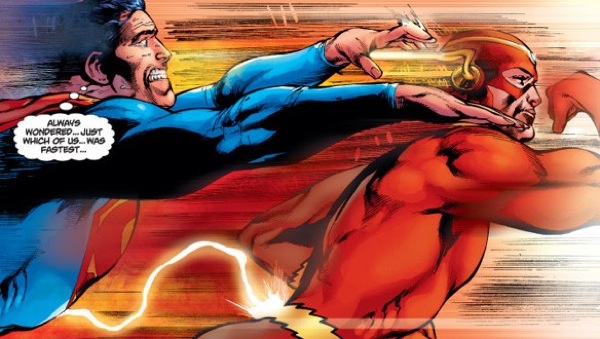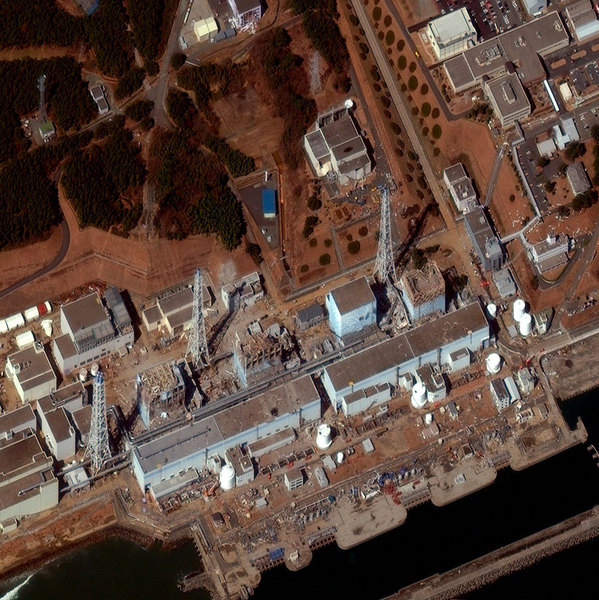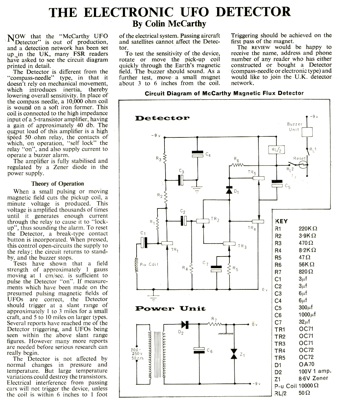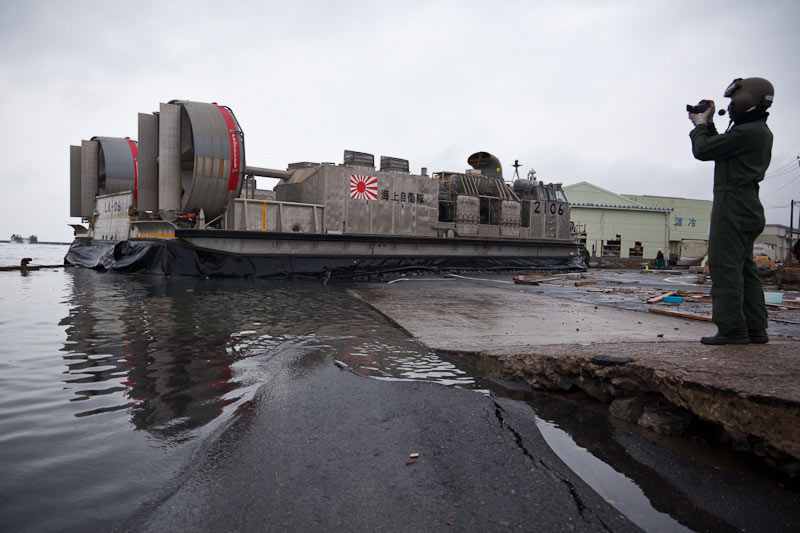The Latest from Boing Boing |  |
- Gadaffi moves on Benghazi: appeal to stop "exterminating civilians"
- Where are the UN resolutions to protect civilians in Bahrain?
- Anti-labor ads celebrate workers taking paycuts and CEOs getting millions
- The debate that killed DC Comics blog comments
- Nice survey of great title design
- Sakura chaser
- Radiation data near Fukushima show little cause for concern (so far)
- Rohrer on Chain World
- HOWTO crack open plastic gadgets without scuffing them
- Days after global nuke experts declare Fukushima Serious Business, Japan raises disaster level to 5
- ICANN okays new .XXX domain
- British longevity
- Assuming women are photoshopped 'beyond recognition' has pitfalls, learns Internet
- Japan nuclear crisis: A real-world example of radiation risks
- Cheshire Cat pocket watch
- Julie Driscoll's "Season of the Witch" (1968)
- HOWTO build an Electronic UFO Detector
- Ex-Goldman Sachs programmer gets 8 yrs in prison for stealing trading system source code
- Cartoonist Adrian Tomine interviewed on Bat Segundo Show
- A "super moon," whatever the hell that is, will rise Sat., March 19
- Japan: disaster relief efforts in north continue (photos)
- Yemen: state of emergency after pro-government snipers massacre protesters
- Japan Nuclear Crisis: "Monirobo," the radiation-monitoring robot, arrives
- The moon has its own time zone
- Andrew Revkin on Japan Nuclear Crisis: "Complexity + Complacency = Calamity"
- Japan earthquake and nuclear crisis: The mental and physical impacts of stress
- Japan nuclear crisis: TEPCO says power line now connected to Fukushima Daiichi plant
- Reluctant witness refuses to admit he knows what a photocopier is
- What it's like to be a black comic writer
- Crying TEPCO chief joins Cavalcade of Sad Guys
| Gadaffi moves on Benghazi: appeal to stop "exterminating civilians" Posted: 19 Mar 2011 04:32 AM PDT Al Jazeera reports that rebels in Free Benghazi are coming heavy fire from Gadaffi's military and its mercenaries: "The international community is late in intervening to save civilians from Gaddafi's forces. Today in Benghazi there will be a catastrophe if the international community does not implement the resolutions of the U.N. Security Council. We appeal to the international community, to the all the free world, to stop this tyranny from exterminating civilians." |
| Where are the UN resolutions to protect civilians in Bahrain? Posted: 18 Mar 2011 11:33 PM PDT Slate's Tom Scocca reminds us that the west's willingness to rescue pro-democracy protesters from brutal, murderous middle-eastern despots is highly selective. If you're rebelling against a dictator who's been a thorn in America's side, you get airstrikes and UN resolutions; if you're rebelling against tyrants who are forthcoming with their oil or ports, you're lucky if the Secretary of State will bestir herself for a round of finger-wagging as your comrades are coldly murdered in the streets. The helpful thing, if you're overwhelmed by so much news going on at once, is that Bahrain is roughly the same story as Libya--only instead of pro-democracy protesters being murdered by a terrorist-sponsoring monster of a dictator who has been on America's enemies list for ages, the pro-democracy protesters are being murdered by a government that is America's very own dear ally. And where Qaddafi brought in foreign mercenaries for support, King Hamad bin Isa al-Khalifa of Bahrain brought in troops from our even more vital ally, Saudi Arabia...Would a No-Fly Zone Over America Save the Democracy Movement in Bahrain? (via Making Light)
|
| Anti-labor ads celebrate workers taking paycuts and CEOs getting millions Posted: 19 Mar 2011 12:23 AM PDT A new radio spot paid for by the Koch brothers extols the spirit of cooperation that led unionized workers at Harley-Davidson to take a pay cut for the good of the company. What it doesn't mention is the $6.5 million paycheck the company's CEO handed himself that year. (Thanks, SalJake, via Submitterator!) |
| The debate that killed DC Comics blog comments Posted: 18 Mar 2011 09:01 PM PDT  DC Comics apparently shut down commenting on its blog The Source after things got ugly in a thread about an eternal question: Who runs faster, Superman or The Flash? "DC's Blog Closes Comments, Gives Up On Even Trying To Talk to You Jerks" (Comics Alliance via @mattsinger, thanks Mark!) |
| Nice survey of great title design Posted: 18 Mar 2011 05:24 PM PDT A Brief History of Title Design from Ian Albinson on Vimeo. Last year, Pesco mentioned the new SXSW Title Design Competition. Ian Albinson's presentation video for this year's SXSW "Excellence in Title Design" competition screening summarizes a lot of the really good work in film (and some recent television), from Intolerance, to Enter the Void. Some good films to add to your watch list, too. Link has full list of titles. Video link. |
| Posted: 18 Mar 2011 05:16 PM PDT  In Japan today, some of the flowering cherry trees are blooming early. Photo courtesy Matt Alt, taken in Tokyo. |
| Radiation data near Fukushima show little cause for concern (so far) Posted: 18 Mar 2011 04:56 PM PDT  Their determination? "The first radiation measurements from within a 37-mile radius of the disabled Fukushima Dai-ichi power plant do not reveal any immediate health threat - and perhaps not even any health problems measurable decades from now, if levels stay where they are." But it's all about the "if." The greatest concern right now is that the situation is not yet stable; if that doesn't change, the possibility of a catastrophic radiation leak exists. (Image: NPR) |
| Posted: 18 Mar 2011 04:53 PM PDT Rock Paper Shotgun talked to Jason Rohrer about Chain World, his USB-stored Minecraft saved game. Set up to be passed from player to player, each permitted just one life, Chain World explores the hinterland between games and religion. |
| HOWTO crack open plastic gadgets without scuffing them Posted: 18 Mar 2011 04:41 PM PDT Need to get into a laptop or cellphone? Ryan O'Horo describes how to open snapped-shut plastic enclosures using a credit card. The best part is that you have to cut up the credit card. [CraveDIY via Make] |
| Days after global nuke experts declare Fukushima Serious Business, Japan raises disaster level to 5 Posted: 18 Mar 2011 04:47 PM PDT  Japan's nuclear safety agency (NISA) today raised the level of the crisis at the Fukushima nuclear plant from level 4 (local consequences) to level 5 (wider consequences, same level as Three Mile Island), on the 7-point scale* created by the International Atomic Energy Agency (IAEA). NISA's assessment was declared retroactive to Tuesday. More on the story: New York Times, Kyodo News, NHK English (with video). * Okay, 8 levels if you include the "zero" default.
PHOTO: The damaged Fukushima Daiichi Power Plant in Fukushima is seen in this DigitalGlobe satellite image, taken March 18, 2011. About 300 workers are racing against time to restore power and cooling systems to the six reactors at Fukushima Daiichi and try to avert the biggest nuclear catastrophe since Chernobyl in 1986. Japan has entered its second week after a 9.0-magnitude earthquake and 10-metre (33-foot) tsunami flattened coastal cities and killed thousands of people. |
| Posted: 18 Mar 2011 04:05 PM PDT ICANN's Board of Directors today gave the organization's CEO permission to execute a proposed registry agreement for the .xxx sponsored top-level-domain with ICM Registry. Now, more than ever, the internet is for porn. (Domain Name Wire) |
| Posted: 18 Mar 2011 03:55 PM PDT |
| Assuming women are photoshopped 'beyond recognition' has pitfalls, learns Internet Posted: 18 Mar 2011 03:41 PM PDT  As soon as I saw that Wired had put excellent lady engineer Limor Fried on the cover, my first thought was Yes! Finally! My second thought was "Angry people will find something to be angry about here!" And so it was, with Good magazine writing that Wired had "photoshopped a Lady scientist beyond recognition" and that it is "fucking wrong." Good even dug out an old photo to prove how 'normal' Fried looks in real life, an act of David Brentian chivalry if ever there was one. But it doesn't really matter, because strong women do not need Homo Internetii to defend their honor. At Boing Boing and elsewhere, Fried commented: "The cover is stylized but that is really what I looked like. I was not 'plasticized' or 'heavily photoshopped'. if I take off my glasses, have my hair done, and wear make-up its what I look like." As soon as I saw that Wired had put excellent lady engineer Limor Fried on the cover, my first thought was Yes! Finally! My second thought was "Angry people will find something to be angry about here!" And so it was, with Good magazine writing that Wired had "photoshopped a Lady scientist beyond recognition" and that it is "fucking wrong." Good even dug out an old photo to prove how 'normal' Fried looks in real life, an act of David Brentian chivalry if ever there was one. But it doesn't really matter, because strong women do not need Homo Internetii to defend their honor. At Boing Boing and elsewhere, Fried commented: "The cover is stylized but that is really what I looked like. I was not 'plasticized' or 'heavily photoshopped'. if I take off my glasses, have my hair done, and wear make-up its what I look like." |
| Japan nuclear crisis: A real-world example of radiation risks Posted: 18 Mar 2011 02:49 PM PDT  Last night, Xeni posted a link to this chart, showing radiation readings taken in all of Japan's different prefectures, except for Fukushima. I thought it might be useful to put this chart in context with what I've learned about radiation dosages and health from speaking with several health physicists over the last couple of days. First off, a little bit of background. These measurements are coming from the Japanese government, and they're only showing what's going on at one place in each prefecture. It's entirely possible that other people, taking measurements at other locations, would get different numbers. Also, as you can see in the image above, this is showing change in radiation levels over the course of this Wednesday, Thursday, and Friday—March 16 through March 18. The measurements might have been higher or lower in the days preceding this sample, or in the days to come. Disclaimers thus made, let's talk about what these charts show ... The Basics • Thanks to the magic of Google Translate, we can see that the measurements are taken in micrograys per hour. There are a lot of different units of measurement for radiation levels. I've been working mostly in either millisieverts or rems. So I'm going to convert this: 1 microgray = .001 millisievert • So, now let's look at the prefecture with the highest spike in radiation levels. That would be Ibaraki Prefecture. If I'm understanding the chart correctly, the name in parenthesis tells you where, in general, the measurement was taken within the prefecture. So, in this case, the measurement comes from Mito, a city about 2.5 hours North and East of Tokyo. What The Doses Mean • Let's look back at the dose and risk table put together for BoingBoing by the Mayo Clinic health physicist Kelly Classic. There's no entry for .001 millisievert on that table. The lowest it goes is .04 millisievert—the equivalent of a flight from New York to LA. It's a dose so small that it isn't associated with any increase in the lifetime risk of cancer. • But time matters too, not just dose. This isn't just .001 millisievert, but .001 millisievert per hour. If you were exposed to that steadily, for 12.5 days, you'd end up with an actual dose of .3 millisievert—the equivalent of 30 days of natural background radiation, according to Kelly Classic's dose table. That's well above normal levels, but, again, even .3 millisieverts is still a dose that's so low, scientists can't find any evidence that it raises the lifetime risk of cancer. • There's one final thing that matters here, though. Radiation levels in Mito started out at .00025 millisieverts an hour on Wednesday morning. That's where they fell back to after the spike. And they've been roughly around that same level ever since. .00025 millisieverts an hour isn't normal. And that can start to add up. There's 72 hours in three days. At .00025 millisieverts an hour, that gets you to a true dose of .018 millisieverts. Assume the spike lasted 3 hours, and that means the people of Mito have probably gotten close to .021 millisieverts over the last few days—about half the radiation exposure of a flight from New York to LA. The good news is that their overall risk is still low. To reach the point where your lifetime risk of cancer increases by 1%, you'd have to be exposed to 100 millisieverts. That could happen, if radiation keeps leaking out of Fukushima long enough, or if levels go up. But, so far, even though the dose is far higher than normal, the risk is lower than you might think. Putting It All Together • I think this is a really useful example, because it does a particularly good job of showing you how radiation dosages can add up for people living in the direct path of radioactive fallout—there's a reason why we're worried right now about the people who live in places like Mito. But it also demonstrates how fear can be larger than risk. This far from the nuclear power plant—Mito is three hours south of Fukushima—it would take a much larger output of radioactive materials and/or a much longer crisis to really put people at any noticeable risk. |
| Posted: 17 Mar 2011 11:42 PM PDT  This concept design for a Cheshire Cat pocket watch tells the time by the disappearing bits of the mad kitty. The hours are affixed around the outside of the case in normal clockwise fashion. The cat himself is segmented into 5 minute intervals, the grin, appearing first, is 5 minutes, his head is the 10 minute mark, and each stripe is five minutes. The singular minutes are four dots affixed just below and between the 12 and 1 hour markers.Cheshire Cat Pocket Watch Design (Thanks, Paul!) |
| Julie Driscoll's "Season of the Witch" (1968) Posted: 18 Mar 2011 02:42 PM PDT Friday Freak-Out: Julie Driscoll with Brian Auger & The Trinity doing a swinging cover of Donovan's "Season of the Witch," 1968. Available on the greatest hits compilation "Kind of Love in (1967-1971)." |
| HOWTO build an Electronic UFO Detector Posted: 18 Mar 2011 02:33 PM PDT  From a 1968 issue of Flying Saucer Review is this HOWTO on building your own Electronic UFO Detector. It's actually an electronic magnetic field alarm, so even if you're skeptical about UFOs, this device could probably also be used to detect ghosts. From a 1968 issue of Flying Saucer Review is this HOWTO on building your own Electronic UFO Detector. It's actually an electronic magnetic field alarm, so even if you're skeptical about UFOs, this device could probably also be used to detect ghosts."1968 UFO Detector" (Strange Attractor) |
| Ex-Goldman Sachs programmer gets 8 yrs in prison for stealing trading system source code Posted: 18 Mar 2011 04:10 PM PDT Former Goldman Sachs computer programmer Sergey Aleynikov was convicted last December of stealing the confidential source code for the firm's high-speed trading system. Prosecutors have since been debating with his lawyers over his sentence. The decision came today: U.S. District Judge Denise Cote gave Aleynikov more than eight years in prison. (WSJ) |
| Cartoonist Adrian Tomine interviewed on Bat Segundo Show Posted: 18 Mar 2011 01:49 PM PDT  Cartoonist and illustrator Adrian Tomine (author of the terrific little book Scenes From an Impending Marriage) was recently interviewed on the Bat Segundo show. (I love this cover Adrian drew for The New Yorker.) Subjects Discussed: Doing time in Sacramento, veiling a personal experience with a sex change, which of Tomine's characters is least like him, the liberation that comes in fabrication, scratched out names and Victorian literature, the original small audiences for Scenes and 32 Stories, the father's fund, taking criticisms to heart, the drawbacks of working in the same realist vein, Tomine's wife as the "first audience," the artist's fragile ego, the influence of printed literature and storytelling upon art, humbling versions of inspiration, Tomine's degrees of aspiration and ambition, living a life in service to the drawing, facing the world, the "strenuous" exigencies of cartoonists, drawing panels without decor, Tomine's perfectionist qualities, the freedom in pursuing work that isn't going to be reviewed, feeling highly scrutinized, the pleasure in publishing harsh letters, the look of the ranger, using the fewest lines to get the maximum amount of detail, settling upon the three panel approach, maintaining a private style in secret scrapbooks, varying levels of creative insulation from the public, the very low frequency of sound words, the tongue licking in "Alter Ego," seeing external details that other characters cannot, the grotesque reality of Chris Ware's furry cats, the number of people who read books in Tomine's New Yorker illustrations, the Venn diagram between 1990s subcultures and digital culture, disappearing subcultures, cartoonists who detest hippie and hipster culture, gesture and look, Alison Bechdel's elaborate photographic process, and the pursuit of "realism" in an "unreal" medium.Cartoonist Adrian Tomine interviewed in Bat Segundo Show |
| A "super moon," whatever the hell that is, will rise Sat., March 19 Posted: 18 Mar 2011 01:42 PM PDT On March 19th, a full Moon of "rare size and beauty" will rise in the east at sunset. The super "perigee moon" will be the biggest in nearly two decades. (NASA) |
| Japan: disaster relief efforts in north continue (photos) Posted: 18 Mar 2011 01:33 PM PDT  Photo above, by Max Hodges (blog, Twitter): Japanese Self-Defense Forces delivering supplies to an elementary school converted into a shelter in Ishinomaki, after the earthquake and tsunami. Below, a survivor taking refuge in the Ishinomaki shelter. More of Max's photos, taken on March 15 and 16 in northern Japan: maxhodges.com |
| Yemen: state of emergency after pro-government snipers massacre protesters Posted: 18 Mar 2011 01:20 PM PDT Yemeni security forces and plainclothes snipers on rooftops shot dead up to 42 protesters at an anti-government rally in Sanaa after Muslim prayers on Friday. President Ali Abdullah Saleh has since declared a state of emergency. "The Interior Ministry put the death toll at 25, but doctors said 42 people had died and at least 300 were injured." (Reuters) |
| Japan Nuclear Crisis: "Monirobo," the radiation-monitoring robot, arrives Posted: 18 Mar 2011 01:08 PM PDT  A remote-controlled disaster monitoring robot has reportedly been dispatched to Fukushima Daiichi Nuclear Power Station, to measure radiation levels within a site now so contaminated, it is unsafe for humans. Monirobo ("monitor" + "robot") was developed by the Nuclear Safety Technology Center, at Japan's Ministry of Education. Monirobo is about 32 inches long, 52 inches in diameter, and 52 inches high, and weighs about 1300 pounds (600kg). It can travel up to 131 feet (40m) per minute, and carries a camera and manipulating "arms" with various measuring instruments. The wireless controller can be operated remotely from a distance of up to about three quarters of a mile (1.1km). Asahi via getnews.jp, more in English at New Scientist. (Thanks, @wiamse) |
| The moon has its own time zone Posted: 18 Mar 2011 12:50 PM PDT The moon has its own time zone—and 9 other things you didn't know about our nearest neighbor in space. (Via Jeremy Hsu) |
| Andrew Revkin on Japan Nuclear Crisis: "Complexity + Complacency = Calamity" Posted: 18 Mar 2011 12:50 PM PDT "The out-of-control status of the 6 Fukushima nuclear reactors and their stored spent fuel rods is a textbook example of 'Don't Know Squared - It's What You Don't Know You Don't Know' that can bring down any system designed by humanity."--Michael Schlesinger, a climate scientist and engineer at the University of Illinois, Urbana-Champaign, in an item by Andrew Revkin of the New York Times. |
| Japan earthquake and nuclear crisis: The mental and physical impacts of stress Posted: 18 Mar 2011 12:37 PM PDT  Science journalist Charles Q. Choi is still in Chernobyl, where he's traveling as a tourist alongside health physicist Vadim Chumak, of the Academy of Medical Sciences of Ukraine's Research Center for Radiation Medicine in Kiev. Choi's latest dispatch is about the hard-to-quantify effects of Chernobyl. When it comes time to pin blame on the disaster for cancers that happened years, or even decades, later, the studies don't all agree. According to Choi, there's a surprising amount of debate within the scientific community about the extent of Chernobyl's health impacts. But there was one really interesting thing in Choi's article that jumped out at me:
The stress associated with disasters is well-known to cause health problems—both mentally, and physically. Given the ways that's played out with the populations affected by Chernobyl, I think it's reasonable to assume that the Japanese are going to be dealing with the public health aftermath of the earthquake, tsunami, and the nuclear crisis for many years, and in many ways that aren't immediately obvious. If you live in Japan, or if you have friends and family who are coping directly with these disasters, it would be a very good idea to seek mental health support of some kind in the near future. Whether that's talking with friends and family about the feelings that dealing the disaster has caused, or something more formal like visiting a therapist, it sounds like mental health should be the thing you think about in a disaster situation once your physical safety has been secured. There's some good pamphlets and information available online, which can help you start the process of coping and healing. At first, after reading this, I was also worried about how the psychological impacts of a disaster might affect people far removed from the actual disaster site. Especially with 24-hour news, and the social/emotional connections formed by Internet communication, it seemed like people in the rest of the world might still suffer from fear and stress caused by the disasters in Japan, even though we aren't at risk in a direct, physical way. But there is some good news here. Although indirect health impacts do happen, most of the studies show that these impacts are mild and transient. Those of us who live far from the site of a disaster may feel stress and fear related to what we see on the news. But, because we are physically safe, and because we can separate ourselves from the disaster and easily go back to our normal lives, we are unlikely to experience the serious psychological effects, or any of the long-term physical effects, that could impact people in Japan. Image: Some rights reserved by alancleaver_2000 |
| Japan nuclear crisis: TEPCO says power line now connected to Fukushima Daiichi plant Posted: 18 Mar 2011 12:33 PM PDT Tokyo Electric Power Co (TEPCO), the operator of the Fukushima nuclear power plant at the center of a nuclear crisis since last week's earthquake and tsunami, just announced it has connected an external transmission line with the Daiichi plant; now, electricity can be supplied. TEPCO says it plans to supply Unit 2 first, followed by Unit 1, Unit 3 and Unit 4 ... because Unit 2 is expected to be less damaged. (Reuters) |
| Reluctant witness refuses to admit he knows what a photocopier is Posted: 18 Mar 2011 11:41 AM PDT In this transcript from an Ohio Supreme Court Case, a Cuyahoga County office worker refuses to answer a simple question: "has the Recorder's office had photocopying machines?" The worker mainains (for ten pages!) that he doesn't know what a photocopying machine is, and can't say whether his office has one: Identifying photocopy machine poses problem for Cuyahoga County official (Thanks, Micah!) |
| What it's like to be a black comic writer Posted: 17 Mar 2011 11:38 PM PDT Comics writer Dwayne McDuffie describes the ridiculous criticism he faced when he took over Justice League and fanboys reacted to the presence of a black writer on their beloved comic. Dwayne McDuffie on the realities of the Black writer in the comic book industry (via Making Light) |
| Crying TEPCO chief joins Cavalcade of Sad Guys Posted: 18 Mar 2011 12:35 PM PDT  Managing Director Akio Komori of Tokyo Electric Power Company (TEPCO), the company that manages the more or less totally Fuk-ed Fukushima nuclear plant in northern japan, wept as he left a press conference today. During that press conference, he conceded that the ongoing radiation leaks were serious enough to cause injury or death to those in the highest area of danger, closest to the damaged plant. Some will observe this moment as a genuine display of human grief. Others, including some folks in Japan via Twitter, have expressed anger: TEPCO is responsible for the disaster, the logic goes; they've been less than forthcoming as it unfolded, the situation grows more dangerous each day the crisis remains unresolved, and he might save the tears for after they have fixed it. What's more, thanks to documents leaked by Wikileaks, we now know that TEPCO has a history of mendacious, profit-seeking and safety-risking corporate conduct. I have added him to the Ultimate Cavalcade of Sad Guys. |
| You are subscribed to email updates from Boing Boing To stop receiving these emails, you may unsubscribe now. | Email delivery powered by Google |
| Google Inc., 20 West Kinzie, Chicago IL USA 60610 | |



 Marburger: How about this: Have you ever heard the term "photocopier" or "photocopy" used in the Recorder's office by anybody?
Marburger: How about this: Have you ever heard the term "photocopier" or "photocopy" used in the Recorder's office by anybody?
No comments:
Post a Comment